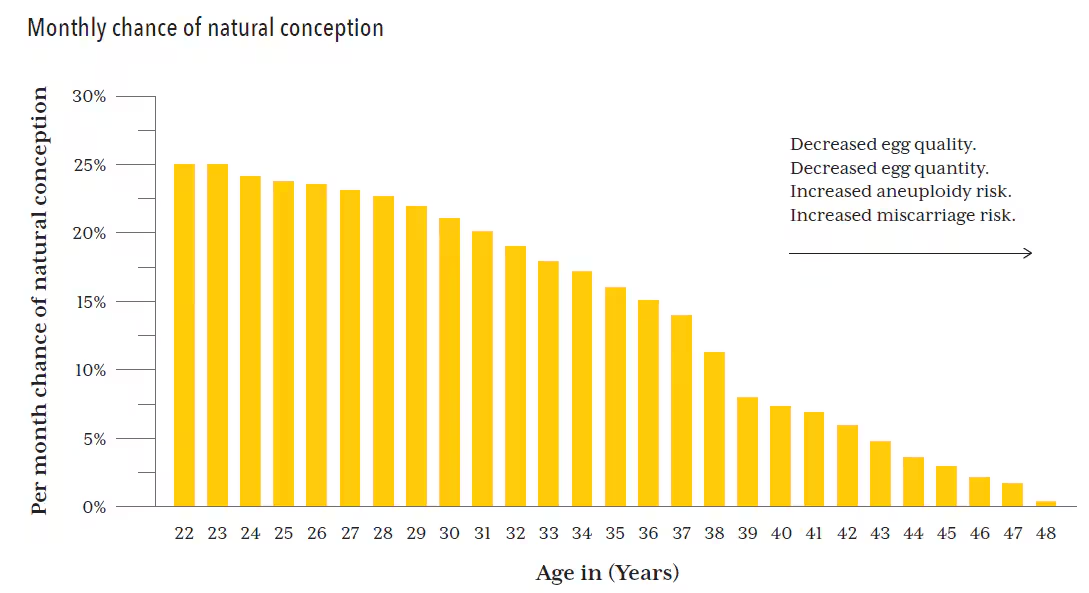
အသက်အရွယ်နှင့် သားဖွားခြင်းအကြောင်း နားလည်ခြင်း။
အသက်အရွယ်သည် သားဥအိမ်နှင့် သုက်ပိုးအရည်အသွေးကို ထိခိုက်စေပြီး ကိုယ်ဝန်အန္တရာယ် တိုးလာခြင်းနှင့် အတူ အမျိုးသားနှင့် အမျိုးသမီး မွေးဖွားမှုတွင် အရေးကြီးသော အခန်းကဏ္ဍမှ ပါဝင်ပါသည်။ Genea ရှိ ကျွန်ုပ်တို့၏သားဖွားမီးယပ်ဆေးခန်း၏ မျိုးဥအေးခဲခြင်းလုပ်ငန်းစဉ်၊ ICSI နှင့် IVF ကုသမှုများသည် အသက်အရွယ်မရွေး သင့်သန္ဓေတည်နိုင်ခြေကို အကောင်းဆုံးဖြစ်အောင် မည်သို့လုပ်ဆောင်နိုင်သည်ကို ရှာဖွေလိုက်ပါ။
ကျန်းမာသောကိုယ်ဝန်ရရှိခြင်းအပေါ် အသက်အရွယ်၏လွှမ်းမိုးမှု
အမျိုးသားများနှင့် အမျိုးသမီးများ အသက်ကြီးလာသည်နှင့်အမျှ ကျန်းမာသောကိုယ်ဝန်ရရှိရန် ရှုပ်ထွေးမှုများ တိုးလာပါသည်။ Genea တွင်၊ ကျွန်ုပ်တို့သည် အသက်အရွယ်ကြောင့် လိင်နှစ်မျိုးလုံးကို အကျိုးသက်ရောက်ပုံနှင့် အဘယ်ကြောင့် စောစီးစွာဝင်ရောက်စွက်ဖက်မှုသည် ကျန်းမာသောကလေးငယ်ကို ကြိုဆိုရန် သင့်အခွင့်အလမ်းများကို သိသိသာသာ တိုးမြင့်လာစေနိုင်ကြောင်း သိသာထင်ရှားစွာ ပေးဆောင်ပါသည်။ ကျွန်ုပ်တို့၏သားဖွားမီးယပ်ဆေးခန်းများသည် IVF၊ ICSI နှင့် မျိုးဥအေးခဲခြင်းလုပ်ငန်းစဉ်ကဲ့သို့သော အထူးပြုကုသနည်းများကို ပေးစွမ်းပြီး သင်၏မျိုးဆက်ပွားကျန်းမာရေးကို အသက်အရွယ်မရွေး အကောင်းဆုံးဖြစ်အောင် ဆောင်ရွက်ပေးပါသည်။
အမျိုးသမီး အသက်အရွယ်နှင့် သားဖွားနိုင်ခြင်း- အချက်အလက်များနှင့် ကိန်းဂဏန်းများ
အသက် 40 နှစ်များအတွင်း ကလေးမွေးသည့် အနုပညာရှင်များ၏ ထင်ရှားကျော်ကြားသော ဇာတ်လမ်းများနှင့် IVF ကုသမှု တိုးတက်လာမှုများကြားမှ၊ အသက်အရွယ်သည် အမျိုးသမီးများအတွက် မိသားစုတစ်ခုစတင်ရန် သိသိသာသာ အတားအဆီးတစ်ခုအဖြစ် ရှိနေသေးသည်။ Genea တွင် ကျွန်ုပ်တို့သည် ကျွန်ုပ်တို့၏ကျွမ်းကျင်သောသားဖွားမီးယပ်အထူးကုများနှင့်အဆင့်မြင့်သားဖွားဆေးခန်းဝန်ဆောင်မှုများမှပံ့ပိုးပေးထားသောအသက်အရွယ်၏မျိုးပွားမှုအပေါ်အကျိုးသက်ရောက်ပုံကိုရှင်းလင်းသောသိပ္ပံနည်းကျထိုးထွင်းသိမြင်မှုကိုပေးပါသည်။
အသက် 36 နှစ်တွင် အမျိုးသမီးတစ်ဦးသည် လစဉ် သဘာဝအတိုင်း ကိုယ်ဝန်ရနိုင်ခြေ 50% နီးပါး လျော့နည်းလာကာ အသက် 20 အစောပိုင်းတွင် မွေးဖွားနိုင်ခဲ့သည်။ လစဉ် သန္ဓေတည်နှုန်းသည် 1% သာ ကျဆင်းသွားသည့် အသက် 45 နှစ်တွင် ဤကျဆင်းမှုသည် ပို၍သိသာလာသည်။ ဤစာရင်းဇယားများကို နားလည်ပြီး လိုက်လျောညီထွေဖြစ်အောင် စီစဉ်ရန် နောက်ပိုင်းတွင် ကိုယ်ဝန်ယူမည့် အမျိုးသမီးများအတွက် အရေးကြီးပါသည်။

မျိုးမပွားနိုင်ခြင်းကို ရင်ဆိုင်နေရသော ငယ်ရွယ်သော အမျိုးသမီးများသည် သားအိမ်ပြွန်ပိတ်ဆို့ခြင်း သို့မဟုတ် သုက်ပိုးအရေအတွက်နည်းသော လက်တွဲဖော်နှင့်ဆက်ဆံရခြင်း စသည့် ဆေးဘက်ဆိုင်ရာပြဿနာများ ကြုံတွေ့ရတတ်သည်။ ဆန့်ကျင်ဘက်အားဖြင့်၊ အသက်ကြီးသော အမျိုးသမီးများတွင် မျိုးမအောင်နိုင်ခြင်းသည် မျိုးဥအရည်အသွေးကျဆင်းခြင်းနှင့် ဆက်စပ်မှုရှိပြီး ကိုယ်ဝန်သည်များသည် ခရိုမိုဆိုမ်ပုံမမှန်ခြင်းကဲ့သို့သော နောက်ဆက်တွဲပြဿနာများကို ပိုမိုခံရနိုင်ချေရှိပြီး ပထမသုံးလပတ်အတွင်း ကိုယ်ဝန်ပျက်ကျတတ်သည်။
ထို့အပြင်၊ လက်တွဲဖော်၏ အသက်အရွယ်၏ လွှမ်းမိုးမှုကို လျှော့တွက်သင့်သည်။ 40 နှစ်အထက် အမျိုးသားများသည် သုက်ပိုးတွင် မျိုးရိုးဗီဇဆိုင်ရာ ချို့ယွင်းချက်များ တိုးလာခြင်းကြောင့် မွေးဖွားနိုင်ခြေ ကျဆင်းလာကာ စုံတွဲများသည် ကိုယ်ဝန်ရနိုင်မှုနှင့် ကလေးအတွက် ကျန်းမာရေးအန္တရာယ်များ တိုးမြင့်လာနိုင်သည်။
ထို့အပြင်၊ ယခင်က ကလေးရှိခဲ့ဖူးသော စုံတွဲများ မွေးဖွားမှုဆိုင်ရာ စိန်ခေါ်မှုများမှ ကင်းလွတ်ခွင့်မရှိပါ။ စုံတွဲများ၏ ခန့်မှန်းခြေ 10% သည် ယခင်အောင်မြင်မှုများရှိသော်လည်း နောက်တစ်ကြိမ် ကိုယ်ဝန်ရရန် ရုန်းကန်နေရသည့် စုံတွဲများ ရှိတတ်ပါသည်။
အမျိုးသား အသက်အရွယ်နှင့် သားဖွားနိုင်ခြင်း- အကျိုးသက်ရောက်မှုကို နားလည်ခြင်း။
မကြာသေးမီက လေ့လာမှုများအရ အမျိုးသားများသည် မျိုးပွားမှုရလဒ်များတွင် အမျိုးသားများ အသက်အရွယ်အလိုက် ပါဝင်သည့် အရေးပါသော အခန်းကဏ္ဍကို ဖော်ပြနေသည်။ ပုံမှန်အားဖြင့်၊ သုတ်ပိုးအရည်အသွေး ကျဆင်းခြင်းကြောင့် အသက် ၄၀ မှ ၄၅ နှစ်အတွင်း အမျိုးသားမျိုးပွားမှု စတင်ကျဆင်းလာသည်။ ဤအသက်အရွယ်ဆိုင်ရာပြောင်းလဲမှုသည် သန္ဓေတည်နိုင်ခြေကို အလုံးစုံလျှော့ချပေးရုံသာမက ကိုယ်ဝန်ရရှိရန် လိုအပ်သည့်အချိန်ကို တိုးမြင့်စေပြီး ကိုယ်ဝန်ပျက်ကျခြင်းနှင့် သန္ဓေသားဆိုင်ရာ ကွဲလွဲချက်များဖြစ်နိုင်ခြေကို တိုးစေသည်။ အသက် 40 နှစ်နှင့်အထက် ဖခင်များမှ မွေးဖွားသော ကလေးများသည် အော်တစ်ဇင်ရောဂါများ ဖြစ်နိုင်ခြေ ငါးဆ ပိုများပြီး schizophrenia နှင့် ဘဝနှောင်းပိုင်းတွင် အခြားသော စိတ်ကျန်းမာရေး ပြဿနာများ ဖြစ်ပွားနိုင်ခြေ အနည်းငယ် ပိုများသည်။
Genea တွင်၊ ကျွန်ုပ်တို့သည် ပြည့်စုံသော မျိုးပွားမှုဆိုင်ရာ အကဲဖြတ်ချက်များနှင့် ကုသမှုများဖြင့် ဤစိန်ခေါ်မှုများကို ကိုင်တွယ်ဖြေရှင်းပေးကာ ဇနီးမောင်နှံများအား နားလည်သဘောပေါက်ပြီး ဖခင်အသက်အရွယ်၏ သက်ရောက်မှုများကို စီမံခန့်ခွဲရာတွင် ကူညီပေးပါသည်။
အသက်အရွယ်နှင့် သားဖွားခြင်းဆိုင်ရာ အမေးအဖြေများ
အမျိုးသမီးများသည် ၎င်းတို့၏ ဆယ်ကျော်သက်နှောင်းပိုင်းမှ အသက်နှစ်ဆယ်နှောင်းပိုင်းအထိ မွေးဖွားနိုင်စွမ်းအကောင်းဆုံးဖြစ်သည်။ အသက် 30 နောက်ပိုင်းတွင် မွေးဖွားနှုန်းသည် ပို၍ လျင်မြန်စွာ ကျဆင်းလာသည်။ အသက် 36 နှစ်တွင် လစဉ် ကိုယ်ဝန်ရနိုင်ခြေသည် 20 အစောပိုင်းများနှင့် နှိုင်းယှဉ်ပါက ထက်ဝက်ခန့် ကျဆင်းသွားပြီး အသက် 41 နှစ်တွင် တစ်လလျှင် 4% သာ သန္ဓေအောင်နိုင်သည်အထိ မွေးဖွားနိုင်စွမ်းလျော့ကျသွားပါသည်။
ဤကျဆင်းမှုသည် ဥအရေအတွက်နှင့် အရည်အသွေးကျဆင်းခြင်းကြောင့်ဖြစ်သည်။ အမျိုးသမီးများသည်မွေးဖွားစတွင် မျိုးဥ ၂ သန်းခန့် ရှိပြီး အပျိုဖော်ဝင်စဥ်ကာလ မှစ၍ ၄၀၀,၀၀၀ ခန့်အထိ တဖြည်းဖြည်း လျော့နည်းလာသည်။
အသက်အရွယ်အရ သန္ဓေအောင်နိုင်စွမ်းလျော့နည်းလာမှု သည် အမျိုးသမီးများနှင့်ယှဉ်လျှင် အမျိုးသားများတွင် သိသိသာသာနည်းသော်လည်း အမျိုးသားများသည်လည်း အသက်ကြီးလာသည်နှင့်အမျှ သန္ဓေအောင်နိုင်စွမ်း တဖြည်းဖြည်း လျော့နည်းလာသည်။ မျိုးမပွားနိုင်သော ကိစ္စများ၏ 40% ကျော်သော အကြောင်းရင်းများသည် များသောအားဖြင့် သုတ်ပိုး မူမမှန်ခြင်းနှင့် အသက်ကြီးလာသည်နှင့်အမျှ သုတ်ပိုးအရေအတွက် လျော့နည်းခြင်းတို့ကြောင့် လွှမ်းမိုးလေ့ရှိသည်။
အသက်အရွယ်နှင့်ပတ်သက်သော သားဖွားမီးယပ်ဆိုင်ရာ စိုးရိမ်မှုများအတွက် အကူအညီရှာဖွေခြင်း။
အသက် 30 နှင့် 40 နှောင်းပိုင်းရှိ စုံတွဲများသည် အထူးသဖြင့် သားအိမ်ပြွန်ပိတ်ဆို့ခြင်းကဲ့သို့သော စိန်ခေါ်မှုများကို ရင်ဆိုင်ရပါက အစောပိုင်း စုံစမ်းစစ်ဆေးမှုနှင့် တိုင်ပင်ဆွေးနွေးသင့်သည်။ Genea တွင် ကျွန်ုပ်တို့သည် အသက်အရွယ်မရွေး၊ အောင်မြင်သောကိုယ်ဝန်ဆောင်နိုင်ခြေကို အမြင့်မားဆုံးဖြစ်အောင် လုပ်ဆောင်ရန် အသိပေးထားသော သားဆက်ခြားခြင်း၏ အရေးပါမှုကို အလေးပေးဖော်ပြပြီး အဆင့်မြင့်ကုသမှုရွေးချယ်မှုများကို ပံ့ပိုးပေးပါသည်။
- ပင်မစာမျက်နှာ ပင်မစာမျက်နှာ
- ဘာကြောင့်Genea ကိုရွေးချယ်သင့်တာလဲ ဘာကြောင့်Genea ကိုရွေးချယ်သင့်တာလဲ
- ဝန်ဆောင်မှုများ ဝန်ဆောင်မှုများ
- ဈေးနှုန်းများ ဈေးနှုန်းများ
- အထူးကုဆရာဝန်များ အထူးကုဆရာဝန်များ
- အောင်မြင်မှုမှတ်တမ်းများ အောင်မြင်မှုမှတ်တမ်းများ
- နိုင်ငံတကာလူနာများ နိုင်ငံတကာလူနာများ
- ဆက်သွယ်ရန် ဆက်သွယ်ရန်
ဝန်ဆောင်မှုများ




